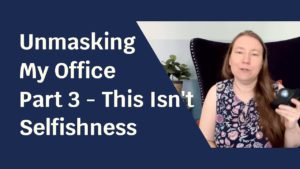
Do you feel more things annoy you?
I wanted to bring up a topic that comes up frequently as my clients start making progress in figuring themselves out and actually improving their life. Often they come to me at some point and say, “Things are more annoying than they used to be, I think I’m getting more sensitive. Is this something that’s going wrong?”
Actually, no. And, in a strange way, it’s actually a sign of progress. So what’s often happening here is that as you’re figuring yourself out, you’re figuring out your sensory stuff, you’re figuring out your communication styles, you’re figuring out your interpersonal dynamics, you’re unpacking old wounds, all of this stuff. You’re getting more specific and figuring out what’s really going on rather than it just being a background haze of stress. You’re starting to notice the individual things that are affecting you, rather than it just being a big, fuzzy cloud of ‘stuff sucks’ and ‘everything feels awful’.
You’re starting to notice the individual things that are affecting you, rather than it just being a big, fuzzy cloud of ‘stuff sucks’ and ‘everything feels awful’.
So it may seem like there’s more things annoying you, but you’re probably just becoming more aware of what they are, rather than them affecting you but not being aware of what’s affecting you. At that point, the natural question then is, “So what do I do about this?”, and there’s roughly three different options of ways that you can deal with this situation.
The first option is to change the thing itself that’s bothering you. You might be able to remove it, you might be able to tweak it, you might be able to do something about it. The second option is to change your mindset about it. How you’re thinking about it can often make a really big difference. And the third option, which is the least obvious, is to change the circumstances so that the thing itself doesn’t come up as often.
Depending on what’s going on, one or more of these may be more appropriate, and others may not be as relevant or may not even apply at all. I’d like to give an example of these three different options.
For example
So, for example, say your boss has a tendency to start one-on-one meetings with you with a phrase something like, “What’s been going on lately?” And your brain likes to give a very direct, and honest, and thorough answer to a direct question.
So you proceed to elaborate at length about all of the things that have been going on, not filtering them for which ones are relevant, which ones your boss might care about or not, it’s just like a diary of all of the things. And in that situation, say your boss ends up picking out one or two of those things and you end up talking about them at length, and it ends up being something that you didn’t really need to discuss. Like, you’ve got that, it’s handled, it’s good. But you spend a large chunk of the meeting talking about it, and it just really didn’t need to be talked about.
Like, you’ve got that, it’s handled, it’s good. But you spend a large chunk of the meeting talking about it, and it just really didn’t need to be talked about.
And so you’d like to change this dynamic. You’re realizing that this is something that has been bothering you. Maybe the question itself is bothering you and you’d like to figure out a better way to deal with this. With option one, remove, or change the actual thing that’s annoying.
Option: change the dynamic
So in this situation, it might be talking to your boss and saying, “Oh, so when you ask this, this is how my brain interprets it, and this is what happens. So that’s why we’re getting this dynamic all the time.”, “Would you mind..?”, “Would you be able to..?”, “Would you be open to..? Asking me a different question… you might ask me something like, ‘what are the things that you need to bring to my attention at this point?’”
Based on your boss’s communication habits, and openness to adaptation and change, she may or may not be able or willing to make that accommodation for you. Just like you may or may not be able or willing to change your own communication styles, and habits, and needs.
Option: change your mindset
Alright, so option two is to change your mindset. In this situation, it would be recognizing when your boss asks, “So how are things going lately?” She’s not really looking for a diary summary of all of the things that have happened. So what is she trying to accomplish by asking that question? It could just be a polite conversation starter, or what she’s intending is to elicit from you things that need to be brought to her attention.
You might be able to translate that in your brain, so that when you hear the phrase, “How are things going lately?” That translates to “What are the things that need to be brought to my attention?” And you answer that question, because that is the question that she’s actually asking, even if the words are different. If you can make that equivalency in your brain, then you can answer the question that she is intending to ask whether or not the words in the sentence are the ones that get translated into your brain.
Again, you may or may not be able or willing to do that, I find that I can do that with some stock phrases. Some of them I can’t do, and I’ve haven’t really found any rhyme or reason to why. Some of them work in my brain and some don’t, but that’s option two.
Option: change the circumstances
Option three would be to actually change the circumstance to avoid the question coming up at all. So in this situation, if your boss has these freeform-flowing meeting styles, that just starts out with asking this sort of very open-ended general question and hoping that something good will come of it. You might suggest to your boss that you start using an agenda, or that you could email her in advance with a couple of things that you need to discuss.
Once the meeting starts having that form of ‘we’re talking about specific tasks,’ it’s easier for it to then continue being in that form of talking about specific things that are going on.
If she’s not open to making those suggestions, you can start walking into the meeting, saying the ‘Hi, how are you?.. I’m fine today.. Great.’ And then lunch in yourself with, “So there’s something that I’ve been wanting to bring up”, “something that I’d like your help with”, or “something’s been on my mind, so I’m really glad that we’re having this meeting. Can I talk to you about something?” And just start with one of the things that you wanted to bring up that you would have put on the agenda if you had one. It might be an agenda in your head, if not on paper or in digital format.
So you can start with bringing up a topic before she asks the question ‘so how are things going lately?’ And once the meeting starts having that form of ‘we’re talking about specific tasks,’ it’s easier for it to then continue being in that form of talking about specific things that are going on.
Alright, so I hope this has given you an idea of different options for dealing with annoying things that you’re noticing more specifically are happening now that you’re figuring yourself out better, and an example of each one in practical use.




